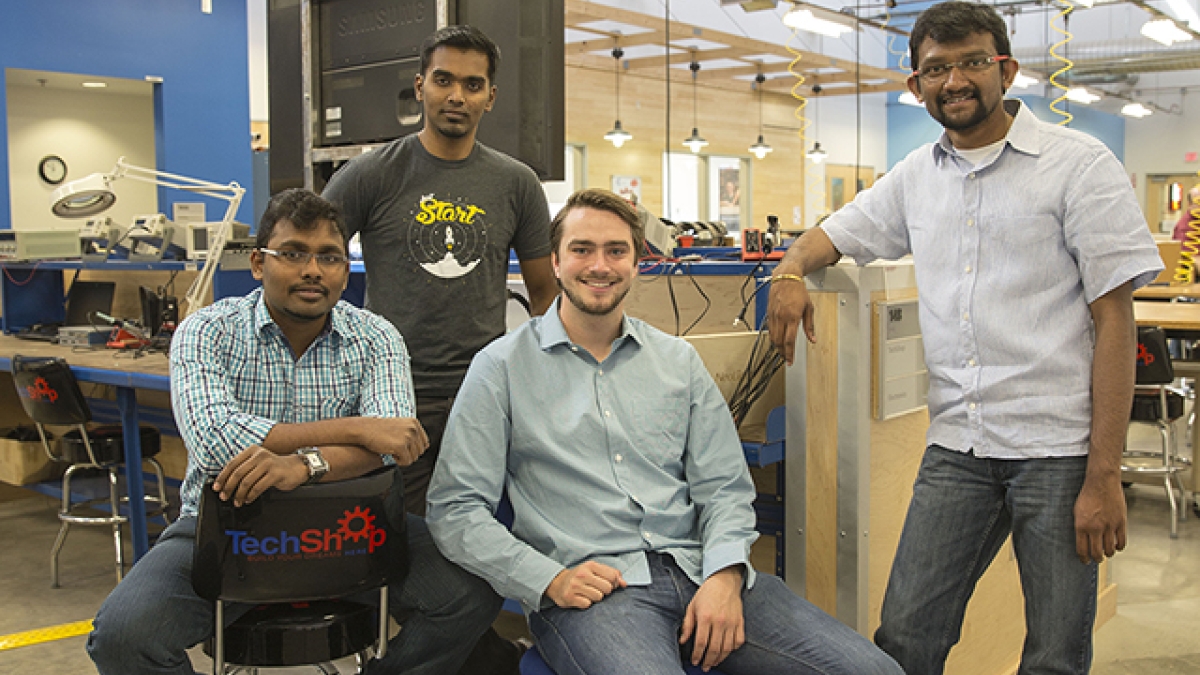ASU alumni illuminate new way to treat jaundice

The co-founders of Neolight (from left): Sivakumar Palaniswamy, Deepak Krishnaraju, Chase Garrett and Vivek Kopparthi at TechShop, located in ASU’s Chandler Innovation Center. Photo by Hayden Taylor/ASU
In less than two years, a group of Arizona State University alumni have taken the seed of an idea and transformed it into a medical tech start-up that secured a $600,000 investment in a seed-funding round earlier this year.
Neolight, a medical-device company focused on the development of phototherapy devices to treat jaundice in newborns, was started in the summer of 2014 by co-founders Vivek Kopparthi, Sivakumar Palaniswamy, Chase Garrett and Deepak Krishnaraju.
The nascent but rapidly developing company has a simple mission.
“Our goal is to eradicate casualties from neonatal jaundice and increase accessibility to treatment,” said Kopparthi, Neolight CEO and W. P. Carey School of Business alumnus.
Jaundice, a condition that affects six out of 10 infants worldwide, is caused by the build up of excess bilirubin due to the inability of an infant’s liver to filter out old blood cells.
Bilirubin is toxic to the central nervous system and can cause brain damage and even death.
Although jaundice is easily treatable with phototherapy, access to devices and electricity to run them is scarce in the developing world, resulting in 219 infant deaths in Africa daily, and more than 1,000 cases of brain damage or death each day in Southeast Asia.
Palaniswamy, an Ira A. Fulton Schools of Engineering alumnus, saw the shortcomings of current jaundice treatment firsthand while working in a hospital in India.
“It was heartbreaking to see five jaundiced babies hoping to see another day under a single blue halogen bulb hanging from the ceiling,” said Palaniswamy.
The phototherapy devices in the hospital represented many of the limitations of current treatment methods. They were bulky, taking up valuable space in an already crowded neonatal intensive care unit, produced excess heat and did not meet the treatment standards required by American Academy of Pediatrics and the U.S. Food and Drug Administration (FDA) guidelines, according to Palaniswamy.
“Every day at the hospital, I asked myself, ‘Isn’t there a better way to do this?’ ” he recalled.
Fast-forward to today, and Palaniswamy has answered his own question.
Neolight has developed improved phototherapy technology to overcome the drawbacks of current treatment methods.
Opposed to using halogen or compact fluorescent tube lamps, the company’s phototherapy device uses cost-effective LED (light-emitting diode) lights that emit light on a narrow spectrum, both speeding up treatment and eliminating side effects like dehydration, skin irritation and erythema. Moreover, Neolight’s device is compact, modular and simple, removing the need for skilled labor to set up and maintain the product.
“If a module breaks, users around the world don’t have to ship their entire device back to us,” explained Kopparthi. “Instead, we simply ship them another module and they’re back to delivering the care their patients need.”
It can also draw power from renewable sources such as solar modules, solving the problem of unreliable energy faced by health-care professionals in developing nations.
The journey from idea to rapidly growing company started with an Edson Student Entrepreneur Initiative grant, which kick-started the team’s endeavor with a $7,000 award.
Open to all ASU students, the Edson Student Entrepreneur Initiative provides support needed to start and grow a venture. The program has enabled more than 260 student teams advance to their ideas in the past 10 years.
The initial award was increased to $25,000, which propelled the company forward to securing more investments, such as the $600,000 Neolight from local anonymous angel investors. The most recent investment will go toward clearing their device with the FDA.
“The Edson program gave us a solid foundation to build upon,” said Garrett, Neolight’s vice president and a Fulton Schools civil engineering graduate. “They offer many things such as Startup School, access to speakers, and programs like pitch practice, which were all tools we could use to navigate through the start-up environment in a way that best fit our needs.”
Support from ASU also came in the form of access to resources at TechShop at ASU’s Chandler Innovation Center, as well as office space at Skysong innovation center, where the company is based.
As well as its ties to ASU, Neolight has established partnerships with the Children’s Hospital Los Angeles and Dignity Health.
Looking to the future, Kopparthi said Neolight plans to begin selling its device within the year, and potentially exploring the use of its technology to treat other ailments.
Much like Neolight’s bold mission to eliminate jaundice casualties, the company has grand plans for the future.
“In five years, we will be the Tesla Motors of medical devices,” said Kopparthi.
More Science and technology

Breakthrough copper alloy achieves unprecedented high-temperature performance
A team of researchers from Arizona State University, the U.S. Army Research Laboratory, Lehigh University and Louisiana State…

4 ASU researchers named senior members of the National Academy of Inventors
The National Academy of Inventors recently named four Arizona State University researchers as senior members to the prestigious…

Transforming Arizona’s highways for a smoother drive
Imagine you’re driving down a smooth stretch of road. Your tires have firm traction. There are no potholes you need to swerve to…

